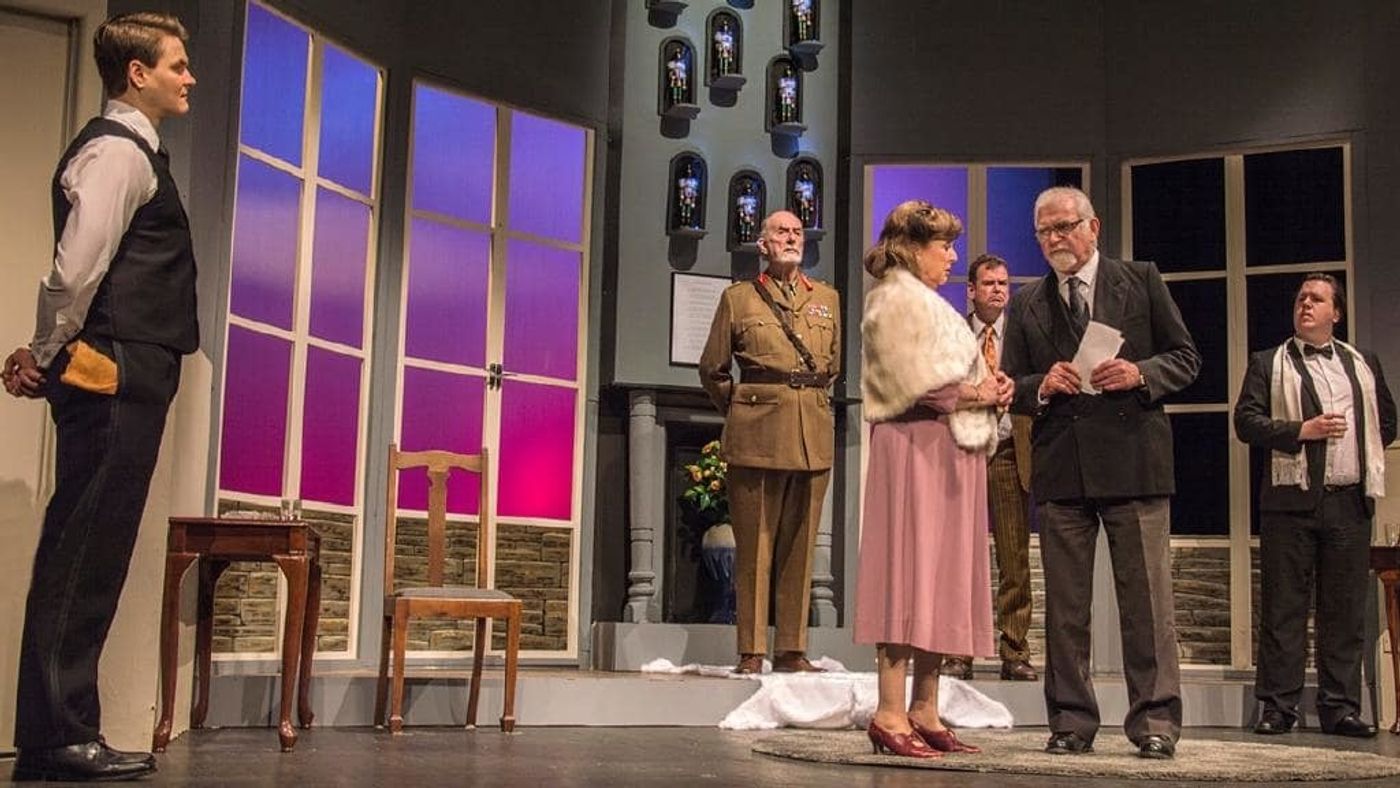Review: AND THEN THERE WERE NONE at ARTS Theatre
 Reviewed by Petra Schulenburg, Thursday 15th November 2018.
Reviewed by Petra Schulenburg, Thursday 15th November 2018.
If, like me, you enjoy a good mystery and perhaps a murder or two, or three, or more, you will find an ample sufficiency in the latest offering from The Adelaide Repertory Theatre in their production of Agatha Christie's And Then There Were None.
The plot brings ten disparate characters together on an island off the coast of Devon. Each was invited by a mysterious U. N. Owen. Each has a skeleton hidden deep in their cupboard that keeps them beyond the reach of the law, but for which their murderous host is intent that they shall receive their just desserts. Each dies in turn, their death mirroring the somewhat gruesome children's nursery rhyme, Ten Little Soldier Boys.
The play is based on Christie's book of the same name, by all accounts one of her best-selling novels ever. (Ed. The original title of the 1939 novel and the 1943 play were changed as they are now deemed politically incorrect) My own introduction to it was at the tender age of 9, when our Grade 4 homeroom teacher read it to us in thrilling weekly instalments. Questions of age appropriateness aside, it was a roaring success with our class and, perhaps for the only time all week, we gave her our undivided attention. We sat, a rapt audience, listening to the grisly details of the passing of yet another character. Plenty of discussion was to be had over recess as to just whom the murderer might be, as the pool of suspects dwindled.
Veteran actor and director Adrian Barnes has assembled an ensemble cast of experienced performers to bring this classic story of mass murder to life on stage. David Haviland, as the revered Judge Lawrence Wargrave, keeps his head as, one by one, the other guests lose theirs. Rachel Williams is just perfect as the (mostly) level headed Vera Claythorne, the secretary whose new employer clearly wishes her dead. Lindsay Dunn plays the mild-mannered Dr Armstrong with a nervous disorder of his own. Simon Lancione, as the dashing rogue, Philip Lombard, makes no apology for his past actions or present intentions on the lovely Vera. Julie Quick inhabits the self-righteous, judgemental, and unbending Miss Emily Brent with a conviction that sees few audience members mourn her timely passing. Peter Davis plays William Henry Blore with appropriate bluster, and Wayne Anthoney delights as the slightly muddled General MacKenzie who is weighed down by the guilt of his long-ago transgression. Thomas Filsell and Kyla Booth play the stalwart servants, Thomas and Ethel Rogers, but whether upstairs or downstairs, our cunning murderer plays no favourites here and both meet their end in turn. Finally, Mark Drury is so convincing as the callous and superficial Anthony Marston that his early death drew applause from the opening night audience. Last, but not least, is the versatile Stanley Tuck, who not only plays Fred Narracott, the local man whose rescue boat mysteriously never arrives, but who also built and bumped in the set, and crews backstage when not onstage.
The set design is well executed, although perhaps an armchair or two would not have gone astray, the highlight being the feature wall above the fireplace with niches for each of ten little soldiers who mysteriously disappear at key points in the unfolding nursery rhyme. It can be deliciously distracting for the audience keenly waiting and watching to see if they can catch them being removed. The costumes, by Rebecca Jarratt, are excellent, particularly for the ladies. They are of the period, with hats and hair to match, lending an air of elegance and working well with the set to recreate a lost time and place, all complemented by lighting designed by Richard Parkhill and sound by Ray Trowbridge.
The pace of the piece is brisk and director, Adrian Barnes, keeps the action moving but, even though I am a huge fan of the story myself, I was often left wondering quite what is the point? The dialogue is of the era, regularly 'clanging' as ridiculous to the modern ear, and many of the characterisations are now almost caricatures of the British society of the times. We even get treated to the slapping of the hysterical young female. Perhaps, overall, a more tongue-in-cheek rendering of the script would have worked better, however, much fun was had by the opening night audience, and what more could anyone ask?
Reader Reviews
Videos

